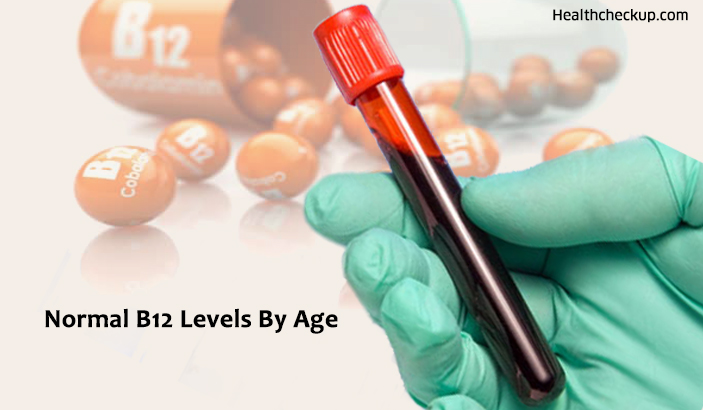What Is Vitamin B12?
Vitamin B12 is a water-soluble vitamin. Some amount of Vitamin B12 is synthesized by gut flora in the colon. However, the body is not able to absorb Vitamin B12 produced in the colon. Diet is the source of Vitamin B12. The primary area of Vitamin B12 absorption is the small intestine. The intrinsic factor helps in Vitamin B12 absorption. It is important to maintain normal B12 levels in the body. Vitamin B12 helps in various essential functions. Vitamin B12 is also known as cobalamin. It is the only vitamin with a metal, cobalt, in its center. The structure of Vitamin B12 is most complex among vitamins. Apart from diet, various vitamin B12 supplements are available in the market.
Here in this article you can how to maintain normal b12 levels by age.
What Are Various Functions Performed By Vitamin B12?
Maintaining Normal B12 levels by age is essential for a healthy body. The following are Important functions performed by Vitamin B12;
Red Blood Cell Formation
Vitamin B12 helps in the formation of Red Blood cells. The deficiency of Vitamin B12 leads to low-level and poor-quality RBCs. Deficiency of Vitamin B12 may cause megaloblastic anemia.
Reduced Risk Of Birth Defects
Normal B12 levels are essential for proper fetal growth. Vitamin B12 is required to reduce the risk of neural tube defects. It also avoids miscarriage and premature birth.
Bone Health
Vitamin B12 levels and bone mineral density are interlinked. Reduced level of vitamin B12 increases the risk of osteoporosis. Osteoblasts require an optimal level of Vitamin B12 for proper functioning.
Eye Health
Vitamin B12 lowers the level of homocysteine. Increased levels of homocysteine increase the risk of age-related macular degeneration. Increased homocysteine levels may also cause other disorders.
Neurological Health
Vitamin B12 improves mood. It does this by maintaining the level of serotonin. Vitamin B12 helps in the normal conduction of nerve impulses. It also improves memory and cognitive function.
Energy Synthesis
Vitamin B12 helps in improving energy levels. A person with vitamin B12 deficiency may feel weak and fatigued.
Cardiovascular Health
High levels of homocysteine have an impact on the heart. It increases the risk of heart disease. Vitamin B12 lowers the level of homocysteine.
Healthy Skin And Associated Structures
Vitamin B12 is helpful in various dermatological disorders. It keeps your skin, nails, and hair healthy.
What Are The Sources Of Vitamin B12?
Following are the sources of Vitamin B12;
- Milk
- Milk products
- Meat
- Poultry
- Fish
- Eggs
- Chicken
- Clams
- Fortified nutritional yeast
- Fortified cereals
What Is The Recommended Dose Of Vitamin B12?
The dose of Vitamin B12 is determined based on age and underlying condition. It also alters based on therapeutic or prophylactic requirements. The general dose of Vitamin B12 is approximately 2.4 mcg in adults. In pregnancy and lactation, the recommended dose is 2.6 mcg per day. The dose varies from 0.4 mcg to 1.8 mcg in children and infants.
What Are The Normal B12 Levels By Age?
There is no significant difference between the normal B12 levels in males and normal B12 levels in females. Normal B12 levels in adults is 200 ng/ml to 900 ng/ml. The level of Vitamin B12 below 200 ng/ml indicates vitamin B12 deficiency. Alteration is also found in normal B12 levels by age. Male children have a slightly lower level of Vitamin B12 as compared to female Children.
| Characteristics | Normal B12 Levels |
|---|---|
| Adult male and female | 200 pg/ml to 900 g/ml |
| 0-1 year (Male) | 227 pg/ml to 1500 pg/ml |
| 0-1 year (Female) | 292 pg/ml to 1202 pg/ml |
| 13-18 years (Male) | 181 pg/ml to 817 pg/ml |
| 13-18 years (Female) | 213 pg/ml to 860 pg/ml |
How Is Vitamin B12 Deficiency Diagnosed?
Blood tests are usually recommended to analyze the level of Vitamin B12 in the body. However, urine can also be analyzed for determining the level of vitamin B12. You are advised not to eat or drink 6-8 hours before testing. The blood is drawn through the aseptic technique and send for evaluating levels of vitamin B12.
What Are Symptoms Of Vitamin B12 Deficiency?
The following are the symptoms of Vitamin B12 deficiency;
- Fatigue, weakness, and lethargy.
- Immune system disorders
- Tingling sensation, numbness especially in peripheral organs
- Pale skin
- Mood instability
- Altered vision
- Sleep disorders
- Anemia
- Mucous membrane damage
- Chronic illness
- Digestive problems
- Hallucinations
- Muscle Weakness
What Are The Symptoms Of Vitamin B12 Toxicity?
Vitamin B12 is a water-soluble vitamin. It rarely gets accumulated in the body. However, when accumulated, may lead to the following symptoms;
- Pruritus
- Contact Dermatitis
- Anaphylaxis
- A special type of acne
- Nausea and vomiting due to high doses
How Is Deficiency Of Vitamin B12 Managed?
There are various ways to manage Vitamin B12 deficiency.
Medications
When there is a severe deficiency of Vitamin B12, intramuscular injections are prescribed. The injections are initially given daily then the dose frequency may change to once weekly. Tablets of Vitamin B12 may also be prescribed.
Nutritional Supplements
Various nutritional supplements containing Vitamin B12 along with other vitamins and minerals are available in the market. These supplements can be taken under the physician’s guidance.
Diet
Taking a diet rich in Vitamin B12 may also help in increasing the level of Vitamin B12.

Rohit Jain is an IPR Specialist and Medical Content Writing Expert. For over a decade, he has written several articles in the areas of female infertility, Erectile dysfunction, hemangioma, cervical cancer, monoclonal gammopathy of undetermined significance, mononucleosis, mitral valve disorder, nerve sheath tumor, shin splints, mild cognitive impairment, cellulitis, brain metastases, atelectasis, MCAD deficiency, lymphoma, sepsis, cardiac rehabilitation and metabolic disorder among others.









